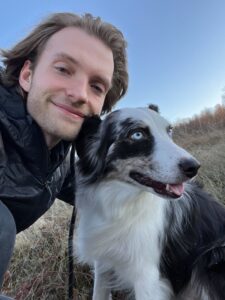Open Philanthropy’s “Day in the Life” series showcases the wide-ranging work of our staff, spotlighting individual team members as they navigate a typical workday. We hope these posts provide an inside look into what working at Open Phil is really like. If you’re interested in joining our team, we encourage you to check out our open roles.
Phillip Greene is a Finance Operations Coordinator at Open Philanthropy, where he assists with contractor onboarding, staff expense reporting, accounts payable, and making Open Phil’s financial processes as seamless as possible. He graduated from the College of Charleston with a B.A. in Arts Management, and holds an M.S. in Accounting from the University of Massachusetts Amherst. Fun fact: Phillip has chromesthesia, a form of synesthesia in which sound involuntarily evokes an experience of color, shape, or movement.

Day in the Life
Open Philanthropy’s Finance team touches most non-grant payments our organization makes, which includes everything from payments to contractors to processing expense reports and sending work test honoraria to job candidates. Our job is simple but crucial: get money out the door efficiently. We serve two main “clients” — our own Open Phil staff and the variety of contractors who support our work. We strive to provide functional, thoughtful, and user-friendly processes to everyone we interact with.
Every Monday, I spend the morning processing work test honoraria — small payments to job candidates for tasks that evaluate their fit for a role. This involves close collaboration with our Recruiting team, external accountants, and my manager, Jake, to keep track of all the details. Right now, Open Phil is in the midst of the “GCR omniround” — a major hiring initiative to onboard 10-15 new members of our Global Catastrophic Risks team — and simultaneously filling positions for a Director of Communications, Finance Operations Coordinator, and People Operations Leader. This means there are a lot of work tests currently being submitted! Some weeks are quiet, with just a few honoraria to handle. But this week, there are more than a hundred. Even though distributing honoraria can be a complex task, I’m proud that we do it — it’s a tangible way that Open Phil shows we value the time of the people who want to work with us, whether or not they end up being hired.
After I finish the last of the honoraria, I’m ready to tackle another recurring task: paying invoices. I process most of Open Phil’s hundreds of monthly bills, which involves gathering approvals from the appropriate parties, recording all relevant details, and meticulously double- and triple-checking my work to ensure accuracy.
Next, I check my inbox and see that a staff member has submitted a contractor request form. After reviewing the details of the project — we’re commissioning a web designer to update a few of our focus area logos — I draft an agreement and send it to the contractor to review and sign. If a contract is complex, I’ll work with our legal team to work out all of the details. Frequently consulting our in-house counsel is a part of my job that’s been surprisingly fun; it’s a great way to learn a thing or two in a field in which I have no expertise. Once the language is finalized, I circulate the contract for signatures, and the contractor is added to the growing number of people who support Open Phil’s mission.
Around this time, Skye, my Australian Shepherd/Border Collie mix, begins to stare at me longingly, which is a signal that it’s time to take her out for a run. I live in snowy Rochester, New York, so I’m grateful for the chance to take an extended midday break when the sun is at its peak.
In the afternoon, I carve out some time to focus on process improvement, one of my favorite responsibilities at Open Philanthropy. Coming from the corporate world, I find it refreshing to be encouraged to go beyond executing rote instructions and actively identify more efficient ways to get things done. One notable improvement we made recently is how we collect payment information from contractors. Previously, we depended on lengthy email exchanges or third-party sites for this purpose. Now, thanks to a collaborative effort with the Salesforce team, we’ve introduced a new payment form that we maintain internally. Compared to relying on third-party apps that are imperfect for our usage, this approach offers a more professional and seamless experience.
To close out my day, I’m working on something special for our upcoming Togetherness Week: a discussion guide for the next Movie Club meeting.[1]Open Phil also has a Book Club that’s currently reading The Remains of the Day by Kazuo Ishiguro and a choir called the “Open Philharmonics”. This time, we’re watching and discussing Ari Aster’s Midsommar.[2] In addition to the discussion guide, I prepared a pre-viewing guide with timestamps for the most disturbing parts, so that my cinephile colleagues can watch with confidence even if they’re not fans of graphic horror. Since I work remotely, I’m really excited to fly into San Francisco and have face time with my colleagues. Open Phil staff are quick-witted and hilarious conversationalists, and I’m optimistic that exploring the world of Swedish pagan cults will inspire a new round of memes for our #watercooler Slack channel.
Footnotes
| 1 | Open Phil also has a Book Club that’s currently reading The Remains of the Day by Kazuo Ishiguro and a choir called the “Open Philharmonics”. |
|---|---|
| 2 | In addition to the discussion guide, I prepared a pre-viewing guide with timestamps for the most disturbing parts, so that my cinephile colleagues can watch with confidence even if they’re not fans of graphic horror. |